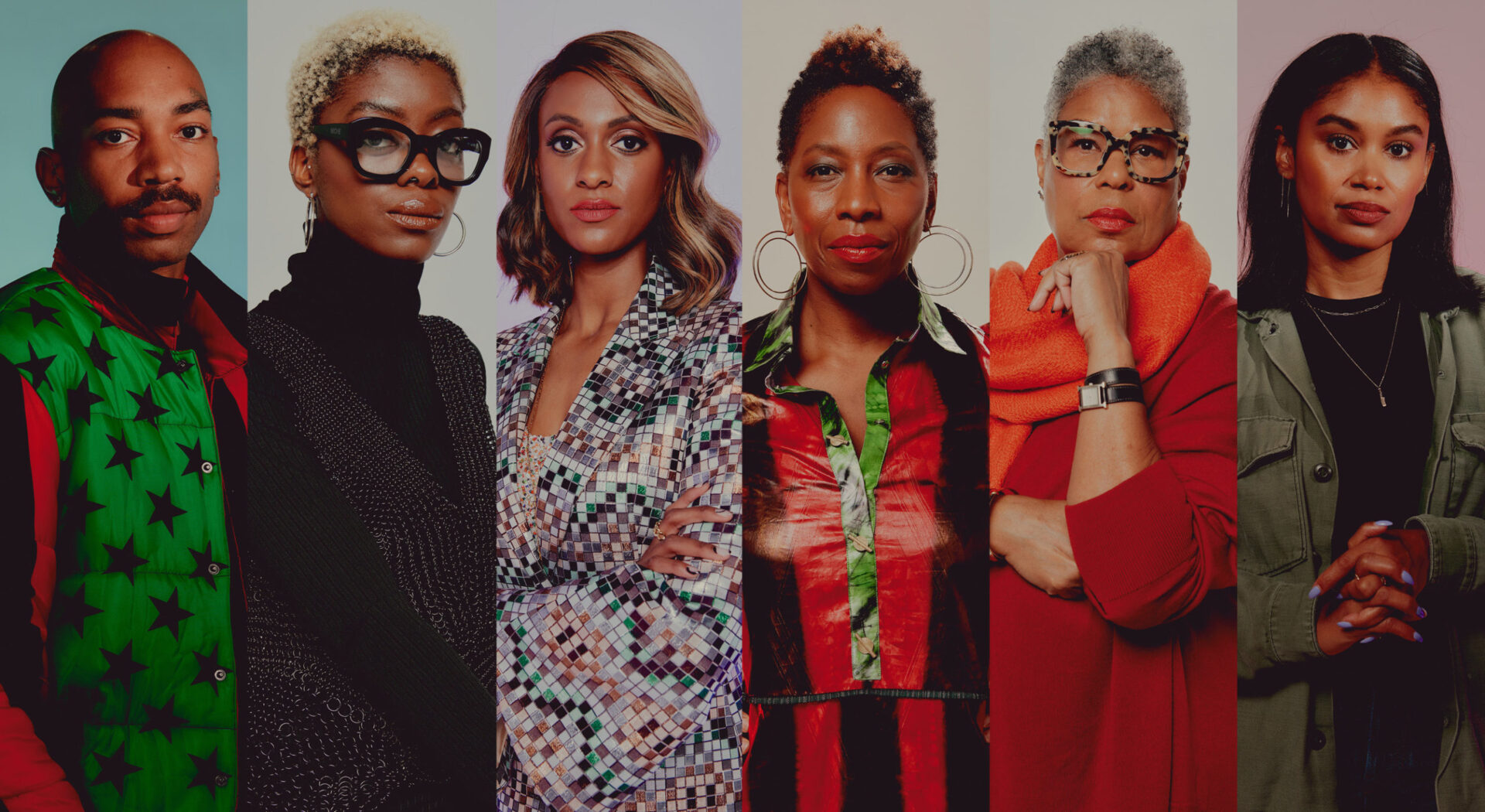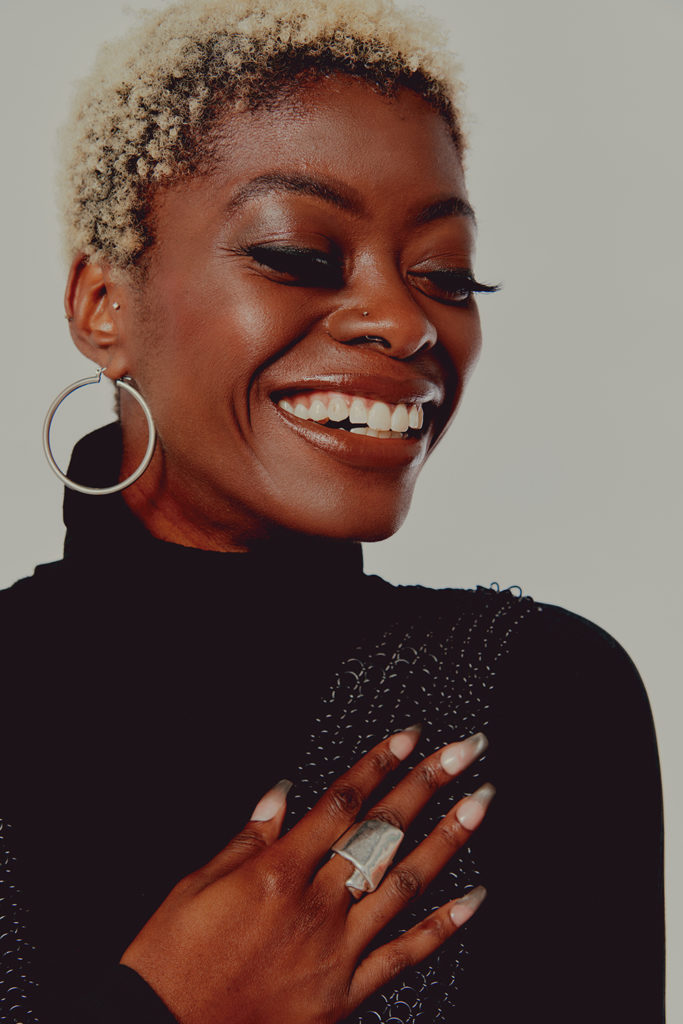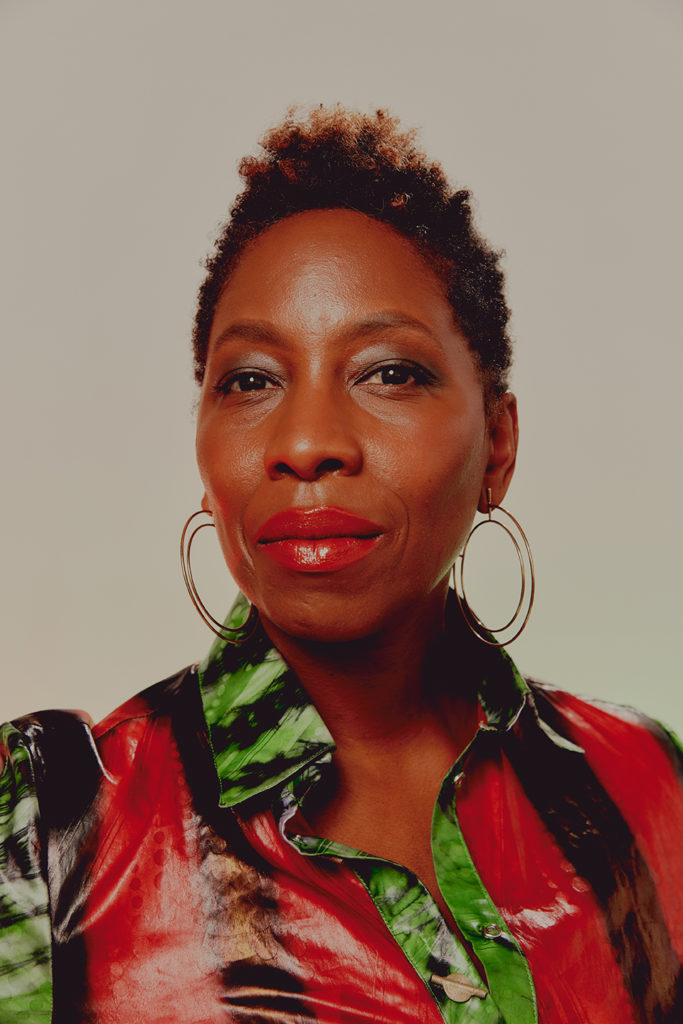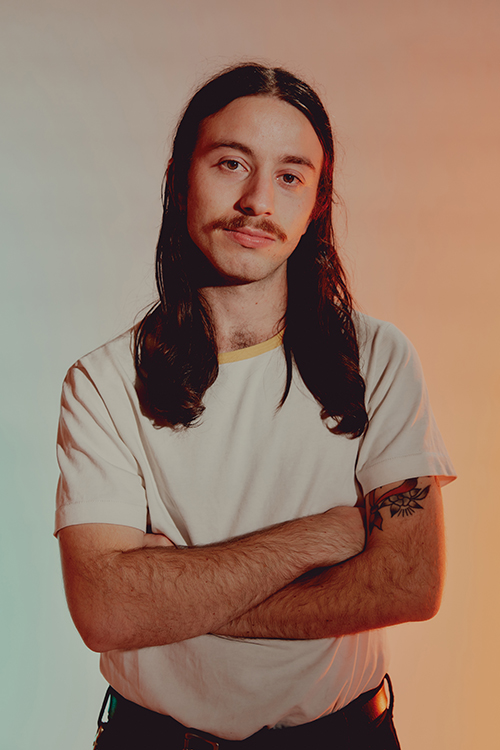

Photos by Victor Llorente ’19
Text by Jonathan Vatner
The Social Justice Center at FIT represents an ambitious step toward greater equity in the creative industries. But it’s far from the first. Many alumni have taken strides toward visibility, representation, and economic parity for designers and entrepreneurs of color.
Jillian Mercado ’10, a star of Showtime’s The L Word who has muscular dystrophy and uses a wheelchair, has made advocacy for people with disabilities an integral part of her career. In 2020, she founded Black Disabled Creatives, a platform promoting this underrepresented group. Fashion designer Victor Glemaud ’98 created IN THE BLK, a global network of Black designers and creatives. And in 2007, Brandice Daniel ’12, who is on the advisory council of the Social Justice Center at FIT, founded Harlem’s Fashion Row, which promotes emerging designers of color. There are many more examples.
Photographer Victor Llorente ’19 created indelible portraits of six alumni who have launched initiatives to lift others in their industry. Llorente’s images, intense and surprising, regularly appear in the pages of New York magazine, The New Yorker, Rolling Stone, and more. Through his lens, the personality and power of these six alumni shine bright.

Kamille Glenn
Interior Design ’13
Founder, dsgnrswrkshp
Kamille Glenn was one of only two Black Interior Design students out of 60 in her graduating class at FIT. When she joined the team at the noted architecture and design firm Rockwell Group, she noticed that the ratio had not improved. “It was my dream job,” she recalls. And yet, “I could go through the whole design process and not work with one Black person.”
She came across a notebook she’d kept at FIT in which she laid out plans to start a designer collective; in 2019, she decided its time had come. She’d attended meetups for Black creatives but realized the term was too broad; creatives in marketing, for example, couldn’t relate to her life making things in the studio. Glenn founded dsgnrswrkshp to bring together interior and industrial designers, architects, anyone whose job was to design and build things.
“We want to create a lifestyle and social platform,” she says, “to be a support system on multiple fronts.”

The pandemic quashed a planned launch event, and the emotional toll of George Floyd’s murder, exacerbated by the isolation of working from home, drove Glenn into a lasting gloom. So she hosted a series of online “linkups,” first on Slack and then in person, to talk about participants’ experiences and to address self-care in life and at work. Most of the events have been exclusively for Black makers, but one centered on visibility in design included allies of other races—and drew 140 attendees, three to four times the usual crowd.
In 2020, Glenn left Rockwell Group to focus full time on dsgnrswrkshp. Their first in-person event took place in Prospect Park last July; an in-person holiday party was planned as well. The community now connects 5,000 people, via social media and an email list. Glenn plans to roll out membership packages this year. She hopes to someday establish a physical space as well.
Ultimately, she wants her efforts not only to provide community and support for active designers but also to make the profession more visible to young people thinking about career options.
“I didn’t know until I was 16 years old what an interior designer was,” Glenn says. “We need to bring awareness to the Black community that designers exist so we can have more representation in our schools.”

Malene Barnett
Textile/Surface Design ’96, Illustration ’94
Founder, Black Artists and Designers Guild
Malene Barnett has long been frustrated that Black designers do not receive the same level of recognition as their white counterparts—even as appropriation from Black culture is rampant. In 2018, she decided to do something about it.
“I thought back to my days at FIT, when I was the only Black female in the class,” says the multidisciplinary artist, known for her mold-breaking rug designs. “I didn’t want another generation to deal with what I dealt with.”
Calling on her contacts in the home industry, she compiled a public directory of about 100 Black creatives in six disciplines: architecture, interior design, furniture, textiles, fine art, and ceramics. The Black Artists and Designers Guild (BADG) is not just a resource for anyone looking to hire diverse creatives; the group also collaborates on projects that generate opportunities and increase visibility.
For example, the guild partners with brands to “celebrate the multiplicities of Black joy,” Barnett says. She and four fellow BADG members curated a licensed collection for boutique textile brand S. Harris–Fabricut that includes fabrics, wallcoverings, and trims inspired by global artisanal traditions. Another collection is forthcoming from Pottery Barn.

To increase opportunities for Black participation in designer showhouses, which help home designers establish their reputation, BADG created its own. Obsidian is a virtual concept house by 23 guild members asked to reimagine space in the era of COVID-19. The renderings include an indoor garden, a separate apartment for quarantining, and a legacy wall that would allow inhabitants to archive their history, “from medical records to photographs to recipes.” The next rendition, planned for 2023, will include physical and virtual elements.
The guild also aims to educate. Because the media has largely ignored Black designers, “there is a lack of archival information about the work we do,” Barnett says. In 2021, the guild funded the Creative Futures Grant, four $5,000 scholarships given to two undergraduates and two graduate students in one of the guild’s six disciplines at any U.S. college or university. The awards come with mentorship and other opportunities. Soon, BADG will honor visionaries with a decade or more of active studio practice.

Shannon Maldonado
Fashion Design ’05
Owner, YOWIE
Among the eclectic gifts stocked in her Philadelphia boutique, Shannon Maldonado focuses on products made by Black artists and designers. A locally blended room spray by scent and skincare specialist Redoux, turmeric latte powder by superfood company Golde, and a limited-edition still-life print by illustrator Darien Birks, to name a few.
The diversity on Maldonado’s shelves is impressive, and she believes anyone can do it. “It’s about taking the time to ask around and do detective work. Most ceramicists don’t say, ‘I’m a Black person’ on their website.”

Maldonado even goes a step further, mentoring the emerging designers she works with, giving them the skills to increase profits and grow their businesses—skills she has learned in the five years she has owned YOWIE and a previous decade of experience in the fashion industry. Some of her suppliers, like local ceramicist Malcolm McDowell, have never sold their wares wholesale. She taught him what a line sheet was, suggested a higher price for his products, and cut him some slack when his first order came in late.
Other challenges Black creators and entrepreneurs often face, Maldonado says, are access to capital, education, and prime leases for retail space. Some don’t know anyone else in a creative field.
To foster connections among her neighbors and build goodwill, she hosts events, now held online since the pandemic began. Examples include a zine-making workshop, a lecture by a curator from a local art museum, and a panel of artists of color. “We wanted to remind people that YOWIE isn’t just here to sell you things,” Maldonado says. “We’re really here to be a community member.”

Patti Carpenter
Fashion Illustration ’76, Fashion Design ’75
Principal and Global Trend Ambassador, carpenter + company/Trendscope
Co-founder, The Kaleidoscope Project
During the nationwide reckoning after George Floyd’s murder, Patti Carpenter got a phone call from white interior designer Amy Lynn, who was looking for a way to take meaningful action toward racial justice. Carpenter, who has made a career of bringing the work of artisans of color in developing countries to the U.S. market, was eager to help.

Carpenter and Lynn set up a designer showhouse, featuring only BIPOC designers, to help diversify a predominantly white tradition. They teamed up with the new owner of the Cornell Inn, a Revolutionary War–era estate in Lenox, Massachusetts. The inn’s rooms and common areas were reconceived by 23 designers of color, beautifying the property for guests and giving these underappreciated talents a platform on which to shine. They called it The Kaleidoscope Project.
“Our goal was to center the voices of the diverse community within our industry, to broaden the narrative of what is design, what is style, what is good taste,” Carpenter says. “With more voices at the table, we are all made better.”
Construction took place over a whirlwind four months in early 2021. The opening drew media from across the country, resulting in more than 40 articles in top publications. The designers were invited to speak at major industry trade shows in Dallas; Las Vegas; and High Point, North Carolina, a major home furnishings center.
For Carpenter, the Cornell Inn was just the beginning.
“This is not just a moment,” she says. “We want to make diversity the norm, so that we don’t have to say he or she is a Black or brown designer—they’re just a fabulous designer.”

Antoine Gregory
Fabric Styling ’17, Fashion Merchandising Management ’13
Brand Director, Theophilio
Founder and Editorial Director, Black Fashion Fair
“The fashion space is so white, but Black culture influences so much of what’s popular,” says Antoine Gregory, a stylist and consultant who oversees branding for the CFDA award–winning label Theophilio. Black Fashion Fair is a multipronged effort to help rectify this disparity.
The organization traces its roots to 2016, when Gregory started a Twitter thread called “Black Designers You Should Know.” Each tweet linked to a different designer’s shoppable website. The thread was retweeted more than 1,400 times.
When he looked back two years later, he realized that some of those designers had gone out of business. He felt galvanized to do more.
“You would see a brand that was popular at Fashion Week, like Hood By Air. Two years later, it’s not on the calendar.” He wondered, “How do we not only bring visibility to Black designers but help them sustain their businesses?” Though Hood by Air, founded by fellow FIT alum Shayne Oliver, relaunched in 2019, many others have not.

The Black Fashion Fair website contains a range of features that support the Black design community. An A-to-Z library catalogs designers working now as well as those who made history. A shopping page sells garments, accessories, and jewelry from selected designers. Articles display standout looks in dynamic photographs. The site also includes a web form for teenagers to apply to a free Fashion Fundamentals class at the Brooklyn Sewing Academy, an organization that teaches garment construction skills to individuals and small groups. Black Fashion Fair funds the course to help young Black creatives prepare for a college like FIT.
Gregory believes the web is essential for discovering Black talent—it’s rare for brick-and-mortar stores to carry their work—but the organization isn’t just online. In 2021, Black Fashion Fair and Theophilio hosted a Juneteenth “family reunion” bash, a star-studded intimate dinner, and a book signing with author, director, and photographer Joshua Renfroe. A Black Fashion Fair book came out in February.

Lauren Maillian
International Trade and Marketing ’07
Marketer, Investor, and Entrepreneur
CEO of digitalundivided
Lauren Maillian has an audacious goal: to double the valuation of businesses led by Black and Latina women by the end of 2023. How does Wall Street change the way it values a business? Through advocacy, she says. Like convincing influential investors to bet on these companies, thereby raising their profile. Persuading banks to lend to these women without predatory—and discriminatory—terms. Proving through research and data that minority women–led companies can be successful and profitable.
According to research by digitalundivided, a nonprofit that supports economic growth in minority communities, businesses run by women of color have a significantly lower fail rate (27%) than businesses in general (40%). But finding funding is an uphill battle because the business world is still very much a white man’s game, and female Black and Latina founders are usually not connected to influential investors through family or friends.
“Most women of color in business ride nobody’s coattails because there are no coattails to ride!” she says.

In partnership with Cosmopolitan magazine, digitalundivided launched The New C-Suite, a list of 10 successful businesses created by 12 women of color (two of the companies had cofounders) to demonstrate that BIPOC women can lead in the innovation and technology sectors. The list, which debuted in Cosmo’s October 2021 issue, immediately generated an uptick in sales and investor interest.
Maillian also invests her own money in diverse businesses, and she is breaking barriers in the finance world herself. She joined an all-women special-purpose acquisition company (SPAC) that raised $230 million to take a digitally disruptive consumer company public. It’s only the second all-women SPAC in history, and Maillian is the youngest woman to join one. “It’s been very much a non-minority man’s way of taking companies public for a very long time—but you haven’t seen women do it. Until now.”
